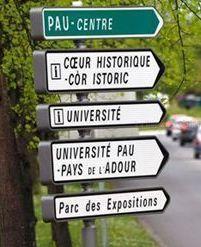Print  |
|


April 2011: Occitan language now used in the street signs of Pau (France)

The website eurominority.eu reports that the town of Pau, in the Pyrénées Atlantiques (South of France), is planning 145 new bilingual “French-Occitan” road signs, as part of the road sign renewal program. These concern information on the main trunk roads and the historical heart of the town, translated as « cor istoric ».
Nevertheless, the case of the town of Pau is neither isolated, nor new: bilingual road signs are in fact increasing throughout French departments since the 80’s. Initiated by the General Consuls (conseils généraux): first in the Brittany departments of Finistère, Morbihan and Côtes d’Armor, and well as in Corsica, in Alsace, and in some of the South & South West departments (covering Basque, Catalan, and variants of Occitan) and finally in the overseas departments and territories.
The national regulations , although not in opposition, didn’t evolve either, despite the amendment of the French Constitution in 2008, which now specifies that « regional languages are part of the French heritage» (art. 75-1). Remember that France still hasn’t ratified the 1992 European Chart of Regional languages, where one of the articles recommends « the use or adoption, if necessary in conjunction with the name in the official language(s), of traditional and correct forms of place-names in regional or minority languages ».
Nevertheless, the use of bilingual French / regional language road signs raises quite a few debates! Among the opponents, you naturally find partisans of French sovereignty: arguments put forward are mostly legibility of the signs and therefore road safety, but also the cost of this bilingualism.
One can nevertheless counter this last argument by referring to the touristic repercussions in the regions able to put their cultural identity forward: in Wales (Great Britain) for example, bilingual road signs have been in use for several decades, without anybody finding fault, and mostly that these have not caused any particular road accident problems!
On the tourist front, you will notice that in the North of the country is one of the towns with the longest names in the world, which, with its 58 letters, draws numerous visitors: Llanfairpwllgwyngyllgogerychwyrndrobwllllantysiliogogogoch. This name means « Saint Mary’s church in the hollow of the white hazel, near a rapid whirlpool and the church of Saint Tysilio of the red cave » and is in fact generally known under its short form: Llanfair-PG…
Created in 1999 and translated into more than 30 languages, the objective of the eurominority.eu website is to broadcast information about European National minorities and Nations without State. The European motto appears here in more than 80 languages, which now gives us the opportunity to mention the Occitan translation: Unitat dins la diversitat !
Read our description sheet about Occitan (in French)
See a video about teaching Occitan
See the Institut d’Estudis Occitans brochure on bilingual French-Occitan road signs
See the Ofis Ar Brezhoneg brochure about bilingual French-Breton road signs








